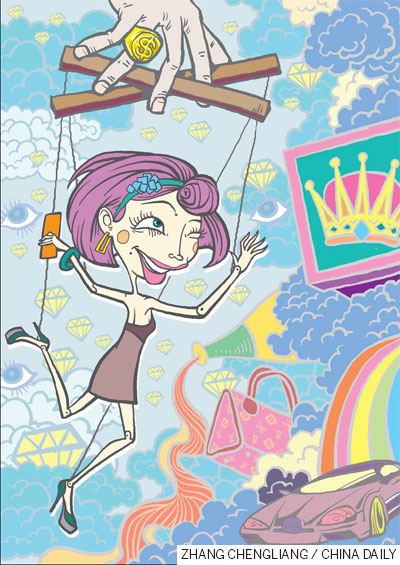Comment
Can advert ban stop hedonism?
By Edward Mills (China Daily)
Updated: 2011-04-12 08:03
 |
Large Medium Small |

Rules on promoting goods as 'luxury' tackles symptom rather than root causes
According to Beijing's new industry and commerce regulations reported by METRO ("Ads promoting wealthy goods, lifestyles banned", March 21), local authorities are to be stricter with companies on what they say in advertisements to promote their products and services.
Those that encourage hedonism, allude to the lifestyles of "emperors and the nobility" or include bad language will no longer be tolerated, with advertisers given until April 15 to sort out their practices or face legal consequences.
In theory it sounds like a good idea. Through economic success, China has seen rapid growth, especially in the cities. Many Beijingers have become rich as a result, which is no bad thing, but it's hard not to see the gaping divide between the haves and have-nots in a city where roads are shared by sanlunche, pedicabs and luxury sports cars.
The authorities are seemingly sensitive to the concerns of the have-nots, or at least those that have less. Ostentatious displays of wealth do little to help maintain a fair and harmonious environment, so it seems reasonable to take measures that aim to reduce them. The definitions of what advertising will be permitted are a bit too vague to be easily enforced, however.
"Hedonism" literally suggests the pursuit of pleasure, although it's doubtful the local government means to discourage citizens from enjoying themselves. Yet, hedonism also carries negative connotations of individuals pursuing pleasure at the expense of others, and perhaps this is what the ban is aimed at curbing, alongside the "craven worship of foreign products".
Deciding the adverts that do illustrate a healthy luxurious lifestyle and those that don't could be a challenge for those tasked with upholding the rules. Furthermore, it could be argued that advertising is but a symptom of the problem, and that the measures, while on the face of it useful, could be better directed at the root. After all, advertising works by convincing the population that buying a product will be the key to a lifestyle that they want. Therefore, some must desire this way of living for the advertising to try and tap into it.
In an increasingly affluent society, finding outlets for accumulated wealth by those secure enough in their financial position to spend it is only natural and by no means a negative position. Luxury goods and high-end products, however, shouldn't be viewed as solely a method to flaunt one's wealth, nor the ability to accumulate seen as a status symbol.
Looking at Western countries, the phenomenon is without doubt present among many people and is just as superfluous. Using Britain as an example, the group that tend to flaunt their wealth are viewed fairly negatively by all sections of society.
They are generally known as nouveau riche, or "new money" - as in those that use their newly acquired wealth in a vulgar manner. It's clear that such a problem is not unique to China and is an issue worldwide.
While the advertising ban may aid the lessening of the problem in the short term, education is clearly the way forward.
Luxury goods are often superior to their cheaper counterparts in a number of ways, from technical innovation to visual design, but owning them does not make one superior to those who cannot yet afford them and obsessing over possession of them is more an unbalanced mental state than a sign of class.
Banning advertising that promotes such a lifestyle is a welcome start to overhauling the egocentric mentality that some possess. I look forward to more measures to combat such negative societal developments.
The author is a British freelance writer based in Beijing. To comment, e-mail metrobeijing@chinadaily.com.cn. The views expressed here do not necessarily reflect those of METRO.
| 分享按钮 |